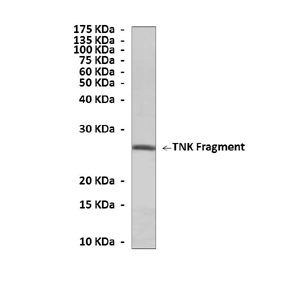Anti-TNK1: Mouse TNK1 Antibody |
 |
BACKGROUND Thirty-eight-negative kinase 1 (TNK1) is a member of the ACK-family of nonreceptor tyrosine kinases and was originally cloned from CD34+/Lin-/CD38-hematopoietic stem/progenitor cells. TNK1 gene is located on human chromosome 17p13.1. TNK1 has been implicated in the regulation of apoptosis, cell growth, nuclear factor-κB, and Ras. In mice, two gene products (Tnk1a and Tnk1b) are predicted to be produced by alternative splicing and use of distinct polyadenylation signals from the murine Tnk1 locus in chromosome 11 (that corresponds to human chromosome 17p13.1). Deduced amino acid sequences from the Tnk1a transcript predict a 72-kDa protein, and when splicing from exons 8 to 9 does not occur, an alternative splicing gene product (Tnk1b) is produced. Tnk1b consists of eight exons encoding a 47-kDa protein that we initially discovered in differentiating murine embryonic stem cells and named it Kos1 (kinase of embryonic stem cells). Kos1 shares the NH2 terminal 380 amino acids containing the entire kinase domain with Tnk1a and contains a unique 54 amino acid sequence at its COOH terminal. However, unlike Ack1 and Ack2, Tnk1/Kos1 lacks a CRIB motif that can bind the GTP-bound form of activated cdc42. The antisera raised against a peptide from the NH2 terminal region of Tnk1/Kos1 detected only a 47-kDa product in cell lines (including human) and other tissues that were analyzed, indicating that the 47-kDa Kos1 might be the predominant protein expressed in mice. Tnk1/Kos1 expression is developmentally regulated in mouse embryos, as well as in differentiating embryonic stem cells in vitro. Forced expression of Tnk1/Kos1 in various cell lines inhibits cell growth by a mechanism requiring its intrinsic tyrosine kinase activity. Importantly, auto–tyrosine phosphorylation of Tnk1/Kos1 results in the suppression of Ras activity. Conversely, expression of a Kos1 kinase-inactive mutant (K148A) transforms NIH3T3 cells, as evidenced by the anchorage-independent growth in soft agar, associated with increased Ras activity. Furthermore, ectopic expression of Tnk1/Kos1 in either human lung or breast cancer cells can partially revert to their anchorage-independent phenotype, suggesting that Tnk1/Kos1 may be a tumor suppressor.1
Tnk1/Kos1 is implicated in negative regulation of cell growth by a mechanism involving inhibition of Ras activation and requiring Tnk1/Kos1's intrinsic catalytic activity. Tnk1/Kos1 null mice were created by homologous recombination by deleting the catalytic domain. Upon aging, both Tnk1+/− and Tnk1−/− mice develop spontaneous tumors, including lymphomas and carcinomas at high rates (i.e. 27%, and 43%, respectively), indicating that Tnk1/Kos1 is a tumor suppressor. Tissues from Tnk1/Kos1-null mice exhibit proportionally higher levels of basal and growth factor-stimulated Ras activation.2 Mechanistically, Tnk1/Kos1 requires either or both Y277 and Y287 sites to be intact for enzymatic activity and phosphorylation of its substrate, growth factor receptor binding protein 2 (Grb2). Data indicate that following tyrosine phosphorylation of Grb2 by Tnk1/Kos1, the Grb2-Sos1 guanine exchange factor (GEF) complex that mediates growth factor stimulated Ras activation becomes disrupted, resulting in the reversal of Ras activation. Conversely, the loss of Tnk1/Kos1 activity results in constitutive activation of Ras due to prolonged stabilization/activation of the Grb2-Sos1 GEF activity. In addition, TNK1 was found to be associated with PLC-γ1, which suggests a role for Tnk1 in phospholipid signal transduction.3 Tnk1/Kos1 is the first tyrosine kinase discovered to have tumor suppressor activity, and the mechanism of spontaneous tumor formation involves constitutive, indirect activation of Ras. Thus, Ras may display “oncogenic activity” without undergoing “oncogenic” mutation.
Tnk1/Kos1 is implicated in negative regulation of cell growth by a mechanism involving inhibition of Ras activation and requiring Tnk1/Kos1's intrinsic catalytic activity. Tnk1/Kos1 null mice were created by homologous recombination by deleting the catalytic domain. Upon aging, both Tnk1+/− and Tnk1−/− mice develop spontaneous tumors, including lymphomas and carcinomas at high rates (i.e. 27%, and 43%, respectively), indicating that Tnk1/Kos1 is a tumor suppressor. Tissues from Tnk1/Kos1-null mice exhibit proportionally higher levels of basal and growth factor-stimulated Ras activation.2 Mechanistically, Tnk1/Kos1 requires either or both Y277 and Y287 sites to be intact for enzymatic activity and phosphorylation of its substrate, growth factor receptor binding protein 2 (Grb2). Data indicate that following tyrosine phosphorylation of Grb2 by Tnk1/Kos1, the Grb2-Sos1 guanine exchange factor (GEF) complex that mediates growth factor stimulated Ras activation becomes disrupted, resulting in the reversal of Ras activation. Conversely, the loss of Tnk1/Kos1 activity results in constitutive activation of Ras due to prolonged stabilization/activation of the Grb2-Sos1 GEF activity. In addition, TNK1 was found to be associated with PLC-γ1, which suggests a role for Tnk1 in phospholipid signal transduction.3 Tnk1/Kos1 is the first tyrosine kinase discovered to have tumor suppressor activity, and the mechanism of spontaneous tumor formation involves constitutive, indirect activation of Ras. Thus, Ras may display “oncogenic activity” without undergoing “oncogenic” mutation.
REFERENCES
1. May, W.S. Jr. et al: Trans Am Clin Climatol Assoc. 2010; 121: 281–293.
2. Hoare, S. et al : Cancer Res. 68:8723-32, 2008
3. Felschow, D.M. et al: Biochem. Biophys. Res. Commun. 273:294-301, 2000
2. Hoare, S. et al : Cancer Res. 68:8723-32, 2008
3. Felschow, D.M. et al: Biochem. Biophys. Res. Commun. 273:294-301, 2000
Products are for research use only. They are not intended for human, animal, or diagnostic applications.
Параметры
Cat.No.: | CP10276 |
Antigen: | Purified recombinant human TNK1 fragments expressed in E. coli. |
Isotype: | Mouse IgG1 |
Species & predicted species cross- reactivity ( ): | Human, Mouse, Rat |
Applications & Suggested starting dilutions:* | WB 1:1000 IP 1:50 IHC n/d ICC n/d FACS n/d |
Predicted Molecular Weight of protein: | 72 kDa |
Specificity/Sensitivity: | Detects TNK1 proteins without cross-reactivity with other related proteins. |
Storage: | Store at -20°C, 4°C for frequent use. Avoid repeated freeze-thaw cycles. |
*Optimal working dilutions must be determined by end user.
Документы
Информация представлена исключительно в ознакомительных целях и ни при каких условиях не является публичной офертой








